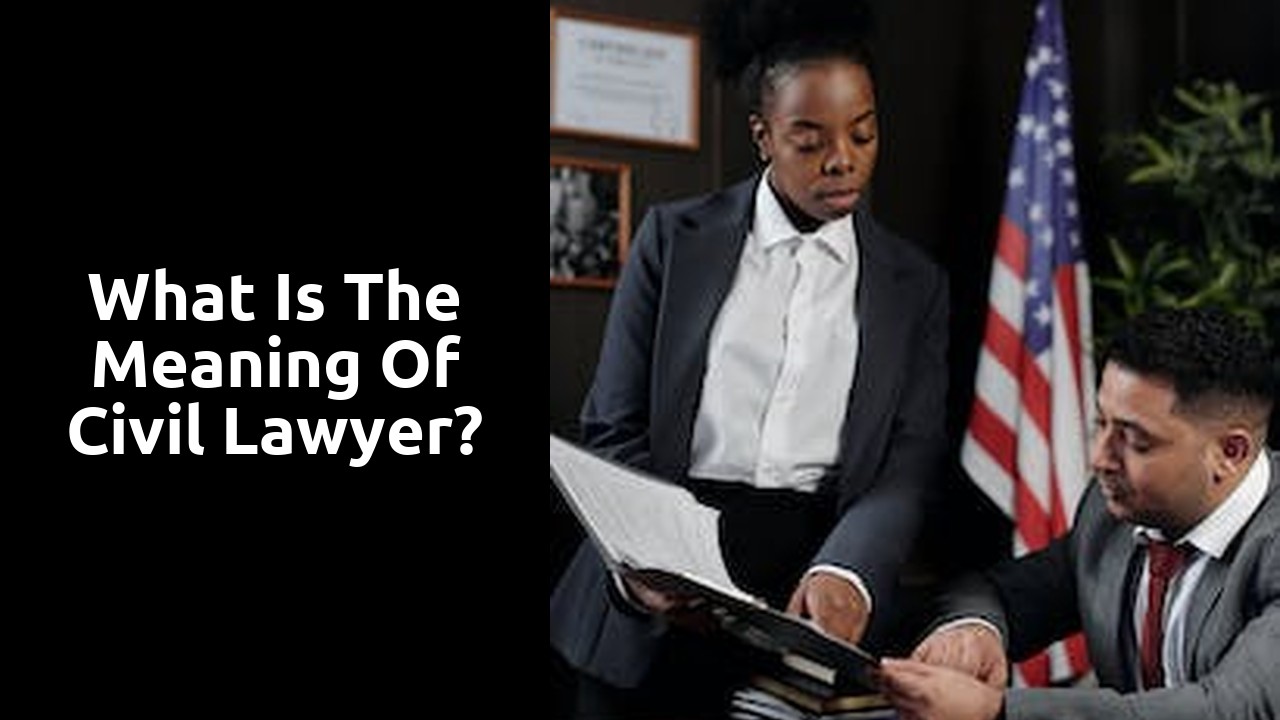Contents
- 1 Understanding the Role of a Legal Professional in Civil Cases
- 2 Unveiling the Purpose and Function of Civil Lawyers
- 3 The Expertise Required to Navigate Civil Law Matters
- 4 Essential Skills and Qualifications of Civil Lawyers
- 5 Exploring the Complexities of Civil Litigation
- 6 The Importance of Civil Lawyers in Protecting Your Rights
- 7 FAQS
- 7.1 What is a civil lawyer?
- 7.2 What type of cases do civil lawyers handle?
- 7.3 How is a civil lawyer different from a criminal lawyer?
- 7.4 What is the role of a civil lawyer in a civil case?
- 7.5 What qualifications and skills are necessary for a civil lawyer?
- 7.6 Do I need a civil lawyer for my civil case?
- 7.7 How do civil lawyers charge for their services?
- 7.8 Can a civil lawyer help me settle my case without going to court?
- 7.9 What should I expect during my initial consultation with a civil lawyer?
Understanding the Role of a Legal Professional in Civil Cases
Civil cases are legal disputes between individuals or organizations that seek compensation or specific relief, rather than criminal punishment. In these cases, the role of a legal professional, specifically a civil lawyer, is crucial. A civil lawyer is an expert in civil law and represents clients who are involved in such disputes. Their main responsibility is to provide legal guidance, advice, and representation to their clients throughout the entire legal process.
The role of a civil lawyer begins with the initial consultation, where they gather relevant information about the case, analyze the strengths and weaknesses, and explain the legal options available. Once the case is underway, they conduct thorough research and investigation, collecting evidence, interviewing witnesses, and preparing legal documents. In court, civil lawyers present compelling arguments, cross-examine witnesses, and negotiate with opposing counsel to achieve a favorable outcome for their clients. Their primary goal is to protect their clients’ rights and interests while ensuring that justice is served in a fair and equitable manner.
Unveiling the Purpose and Function of Civil Lawyers
Civil lawyers play a crucial role in the legal system, specifically in handling cases that fall under civil law. Unlike criminal cases, which involve violations of criminal statutes, civil cases deal with disputes between individuals or entities, typically seeking compensation, resolution of disagreements, or enforceable actions. The purpose of civil lawyers is to represent their clients in these cases, providing legal advice, guidance, and support throughout the legal process.
One of the key functions of civil lawyers is to advocate for their clients’ interests and rights. They work diligently to build a strong case, conducting extensive research, gathering evidence, and preparing legal documents. Civil lawyers are skilled in negotiations and mediation, aiming to settle disputes amicably outside of the courtroom. However, when resolutions cannot be reached, civil lawyers are prepared to litigate and present their clients’ cases in court, ensuring that their rights are protected and that justice is served.
Civil law is a complex and multifaceted field that requires a high level of expertise to navigate effectively. A civil lawyer, also known as a litigation attorney, must have a thorough understanding of the legal principles and regulations that govern civil disputes. They need to possess comprehensive knowledge of various areas of civil law, such as contract disputes, property law, torts, and family law. This expertise is crucial to providing clients with sound legal advice and representation throughout the litigation process.
One of the key skills required to navigate civil law matters is the ability to conduct thorough legal research. Civil lawyers must possess strong research capabilities to gather relevant case laws, statutes, and legal precedents that can support their clients’ cases. This involves analyzing complex legal documents, interpreting statutes, and staying updated on changes in the law. By conducting comprehensive research, civil lawyers can build a solid legal foundation for their arguments and develop effective strategies to advocate for their clients’ rights. Additionally, they need to possess strong analytical skills to assess the strengths and weaknesses of the opposing party’s arguments and identify potential legal loopholes or inconsistencies. With their expertise in civil law matters, these lawyers play a critical role in helping individuals and businesses navigate the complexities of the legal system and seek justice.
Essential Skills and Qualifications of Civil Lawyers
Essential Skills and Qualifications of Civil Lawyers
To excel in the field of civil law, lawyers must possess a range of essential skills and qualifications. First and foremost, a thorough understanding of civil law is crucial. Civil lawyers should be well-versed in various areas of civil law, including contract disputes, property rights, torts, and personal injury claims. This comprehensive knowledge allows them to navigate complex legal statutes and precedents with ease when representing their clients.
In addition, civil lawyers must possess excellent analytical and critical thinking skills. They must be able to assess and understand complex legal documents, identify key issues, and develop effective legal strategies. Attention to detail is paramount, as even the smallest oversight can have significant consequences in a civil case. Furthermore, strong research skills are essential for civil lawyers to gather relevant information, assess the strength of their client’s case, and anticipate potential arguments from the opposing party. Finally, effective communication skills, both oral and written, are vital for civil lawyers to articulate their client’s position convincingly and negotiate favorable settlements. These skills, combined with a passion for justice and a commitment to upholding the rights of their clients, are what sets apart successful civil lawyers in the legal profession.
Exploring the Complexities of Civil Litigation
Civil litigation is a complex legal process that involves resolving disputes between individuals, organizations, or other entities through the court system. It encompasses a wide range of issues, including contract disputes, property disputes, personal injury claims, and family law matters. The intricacies of civil litigation lie in the detailed procedural rules, evidentiary requirements, and the need for persuasive argumentation.
Navigating civil litigation requires a comprehensive understanding of the legal system, as well as the ability to analyze complex legal issues and develop effective legal strategies. Civil lawyers play a crucial role in this process. They are trained professionals who specialize in civil law and are equipped with the knowledge and skills necessary to represent clients in civil litigation. From conducting extensive legal research to preparing and filing legal documents, civil lawyers serve as advocates for their clients, working diligently to protect their rights and achieve the best possible outcome. The complexities of civil litigation demand the expertise of civil lawyers to ensure a fair and just resolution for all parties involved.
The Importance of Civil Lawyers in Protecting Your Rights
Civil lawyers play a crucial role in safeguarding the rights of individuals involved in civil cases. These legal professionals possess extensive knowledge of the intricacies of civil law, allowing them to effectively navigate the complexities of civil litigation. Whether you are dealing with issues related to property disputes, contractual disagreements, or personal injury claims, civil lawyers are equipped to provide you with the necessary legal representation.
One of the key reasons why civil lawyers are essential in protecting your rights is their ability to advocate for you in court. They possess the expertise to analyze the relevant evidence, research precedents, and build a strong case on your behalf. By utilizing their effective communication skills and legal acumen, civil lawyers can present your case in a persuasive manner, ensuring that your rights are upheld and that you receive a fair and just outcome. Additionally, these legal professionals can guide you through the complex procedural requirements of civil litigation, providing you with valuable legal advice and ensuring that you adhere to deadlines and filing requirements. Overall, civil lawyers are instrumental in safeguarding your rights and helping you navigate the legal system with confidence.
FAQS
What is a civil lawyer?
A civil lawyer is a legal professional who specializes in civil law, which involves disputes between individuals or organizations where there is no criminal activity involved. They provide legal representation and advice to clients involved in civil cases.
What type of cases do civil lawyers handle?
Civil lawyers handle a wide range of cases, including personal injury claims, contract disputes, property disputes, family law cases such as divorce or child custody, employment law cases, and more.
How is a civil lawyer different from a criminal lawyer?
A civil lawyer primarily deals with cases that involve private disputes between individuals or organizations, while a criminal lawyer focuses on cases involving criminal offenses committed by individuals against the state or society.
What is the role of a civil lawyer in a civil case?
The role of a civil lawyer is to provide legal representation to clients in civil cases. They gather evidence, research relevant laws, prepare legal documents, negotiate settlements, and present arguments in court to protect the rights and interests of their clients.
What qualifications and skills are necessary for a civil lawyer?
To become a civil lawyer, one must obtain a law degree and pass the bar exam. Additionally, they need excellent analytical and research skills, strong communication and negotiation skills, attention to detail, and the ability to think critically.
Do I need a civil lawyer for my civil case?
It is highly recommended to seek the expertise of a civil lawyer for your civil case. They have the knowledge and experience to navigate the complexities of civil law, ensure your rights are protected, and increase your chances of a favorable outcome.
How do civil lawyers charge for their services?
Civil lawyers typically charge their clients on an hourly basis, a flat fee, or a contingency fee basis, depending on the nature of the case. It is important to discuss fee arrangements with your lawyer before hiring them.
Can a civil lawyer help me settle my case without going to court?
Yes, civil lawyers often attempt to resolve cases through negotiation and settlement discussions before resorting to litigation. Their goal is to achieve a favorable outcome for their clients while avoiding the time and expense of a trial.
What should I expect during my initial consultation with a civil lawyer?
During an initial consultation with a civil lawyer, you can expect to discuss the details of your case, your goals and expectations, and any potential challenges or risks involved. The lawyer will assess the strength of your case and provide guidance on the best course of action.




